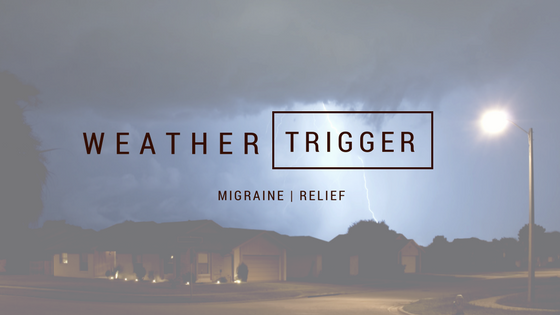Recently, those of us in Florida experienced the wrath of Hurricane Irma. We survived, and are truly blessed, as are many of you in the Florida area. Even though the eye of the storm went right over us at 1:00 a.m. that morning, we were less impacted than others in Florida, and we are so grateful.
If like me, you are one of the many of us suffer at the “hands of the weather” with barometric changes, rain, humidity, etc., you know how miserable it is and how hard that type of migraine trigger can be. Do you suffer with this type of trigger? I know how concerned I was knowing that a hurricane was coming our way, that I would be adversely affected by the weather change and would end up with a migraine. Luckily for me, that did not happen. Sometimes it does and at other time, like this one, the weather doesn’t trigger a migraine.
If you are impacted with atmospheric/barometric changes, finding this to be a migraine trigger for you, my heart goes out to you since this is also a trigger for me. Did you know that this is one of the most common migraine triggers? Studies have shown that 75% of migraine sufferers have migraines that are triggered by changes in the atmospheric pressure.
It is usually a lot simpler if you know your migraines are triggered by a specific food. Eliminating that specific food from your diet obviously helps. However, when a migraine is triggered by fluctuations in the barometric pressure or atmospheric changes, what do you do?
How Does Barometric Pressure Affect Migraine Sufferers?
There is not a definitive explanation as to why these types of headaches occur, but several suggestions have been made:
- A change in electrical charges in the atmosphere (positive ionization, for example, which is linked to the release of serotonin;
- A change in oxygen levels caused by low or high humidity. High humidity reduces oxygen levels, making it hard for us to receive the right amount of oxygen to function properly, and blood vessels expand or contract to compensate; and
- Pressure differences in air trapped in the inner ear or in blocked nasal cavities cause pain similar to sinus headaches.
Migraine triggers and symptoms of migraine need to be tracked so that you can learn how to better manage them and have insight into what your migraine triggers and symptoms are.
How Do You Cope with Barometric Pressure Migraines?
Sometimes, just knowing a migraine is on the way can help you ward off the symptoms by taking measure early in the cycle. This can include preventative medication, or natural remedies. For example, if I know a weather change is coming, I take an extra magnesium tablet, make sure I am well hydrated, and make sure I am well rested.
Here are a few steps you can take to minimize the impact of the weather on your migraines.
- Monitor the weather (you can use your Smartphone/tablet or just watch the weather reports);
- Keep a weather migraine diary. If you are not sure to what extent weather patterns affect your migraines, keep track to help you identify common patterns;
- Control indoor humidity levels. Dehumidifiers can help to regular humidity levels in the home;
- If possible, avoid trigger situations like going out in high winds or extreme heat or cold;
- Stay hydrated. Hot, humid weather can lead to heat exhaustion as well as dehydration, both of which can lead to migraines and headaches. Sip water at regular intervals, and remember that by the time you are thirsty, you are already dehydrated;
- Stay well rested; and
- Try carrying some essential oils – like lavender, peppermint and some of the proprietary blends like Past Tense (check them out by clicking HERE.)
It’s not always easy to be able to stop the beginning of a migraine with unpredictable weather patterns, but if you incorporate some of these strategies into your life, you may be able to minimize the severity and even prevent the triggering of a migraine caused with barometric changes. In these types of situations, being well prepared can certainly work to your advantage.



I use re-hydration and oils to combat all health issues 🙂 Mindfulness, deep breathing and affirmations have been my recent go-to tools for all things related to stress.
Absolutely, Shellie. These are some of my go-to tools as well.